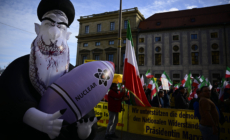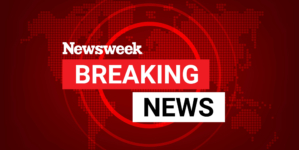-
Car Bomb Kills at Least 15 in Northern Syria, Dozens Injured - 11 mins ago
-
Drake’s Dad Reacts to Kendrick Lamar’s Grammys Success With ‘Not Like Us’ - 46 mins ago
-
Grammys 2025’s Unforgettable Looks: Bianca Censori, Taylor Swift, Chappell Roan - 50 mins ago
-
No More Talk: It’s Time to Destroy Iran’s Nuclear Weapons Program | Opinion - about 1 hour ago
-
With Trump’s Backing Uncertain, Europe Scrambles to Shore Up Its Own Defenses - 2 hours ago
-
Jimmy Carter’s Last Lessons Win Posthumous Grammy Award - 2 hours ago
-
Opinion | I’m the Foreign Minister of Poland. Europe Has Got the Message. - 2 hours ago
-
JT Miller Drastically Changes Everything in Rangers Quest For Stanley Cup - 3 hours ago
-
Three Years After Ukraine Invasion, Europe Still Deals With Energy Crisis - 3 hours ago
-
‘Connections’ February 3rd: Hints and Answers for Game #603 - 3 hours ago
Iran Tells UN Attack from Israel Must ‘Not Go Unanswered’
Iran’s top diplomat has condemned Israel’s unprecedented attack on multiple military sites across the Islamic Republic and has vowed to respond to the latest escalation amid a year-long Middle East conflict in a letter obtained by Newsweek.
The letter was attributed to Iranian Foreign Minister Abbas Araghchi and sent Saturday to United Nations (U.N.) Secretary-General António Guterres and U.N. Security Council President Pascale Christine Baeriswyl via Iranian Permanent Representative to the U.N. Amir Saeid Iravani.
It came less than 24 hours after the Israel Defense Forces (IDF) announced “precise and targeted strikes against military targets in a number of areas in Iran,” said to be a response to Iran’s missile attack against Israel on October 1. That Iranian attack was also portrayed as retaliation for prior Israeli operations in the region, including the assassinations of top Iranian and Iran-allied personnel.
In the letter, Araghchi urged U.N. leadership to condemn “the Zionist regime’s unlawful and aggressive actions, which constitute a serious violation of the sovereignty and territorial integrity of the Islamic Republic of Iran and a flagrant breach of international law and the United Nations Charter.”
Such attacks, according to Araghchi, also “constitute a grave threat to international peace and security and further destabilize an already fragile region.”
“The Islamic Republic of Iran, in alignment with the principles enshrined in the Charter of the United Nations and under international law, reserves its inherent right to legal and legitimate response to these criminal attacks at the appropriate time,” Araghchi added.

ATTA KENARE/AFP/Getty Images
Newsweek has reached out to the IDF for comment.
The extent of the damage incurred by Iran as a result of first-ever acknowledged Israeli attack on Iranian territory remains uncertain. Both sides have hailed the performance of their respective forces as victories.
After the operation concluded, IDF spokesperson Rear Admiral Daniel Hagari said Friday that the Israel Air Force targeted “missile manufacturing facilities used by Iran in its attacks on the State of Israel over the past year” as well as “Iran’s surface-to-air missile arrays and Iranian aerial capabilities that were intended to restrict Israel’s aerial freedom of operation in Iran.”
He said that “Israel now has broader aerial freedom of operation in Iran” and that “we will be obligated to respond” if Iran chooses to launch another round of retaliation.
Iranian officials and media have downplayed the scale of the attack, which was said to have targeted sites in the provinces of Khuzestan, Ilam and Tehran. The Iranian military issued a statement Saturday saying most enemy missiles were successfully intercepted, though some sites were hit and four soldiers killed during the operation.
Araghchi relayed these results to U.N. leadership and stated that, “If not for the successful performance of Iran’s air defense, the Israeli aggression could have resulted in significant casualties.”
He added: “In light of the consequences of the Israeli regime’s ongoing and systematic aggression, the Islamic Republic of Iran urges the United Nations Secretary-General and the Security Council to take a firm stance and condemn the Israeli regime for committing these acts of aggression strongly and unequivocally, demonstrating to the international community that such egregious violations of international law and the UN Charter will not go unanswered.”
“Furthermore,” Araghchi said, “the Islamic Republic of Iran requests the President of the Security Council to convene an urgent meeting to address this severe violation and unlawful actions and ensure accountability of this criminal regime.”
The attack constituted yet another instance of the decades-long conflict between Iran and Israel, long playing out in the shadows, now increasingly emerging as a direct confrontation.
Since Hamas, a Palestinian militant group, launched a massive surprise attack on Israel on October 7, 2023, Iran and its Axis of Resistance allies have launched attacks on the country from Lebanon, Iraq, Syria and Yemen in order to pressure Israel toward a ceasefire in the Gaza Strip. The expanding conflict has seen Israel expand its targeting of foes abroad in operations both claimed and unclaimed.
While Iran has long aided non-state actors opposed to Israel, the Islamic Republic was first brought directly into the fold in early April after Israeli warplanes killed senior Islamic Revolutionary Guard Corps (IRGC) officials at Tehran’s embassy complex in the Syrian capital of Damascus. Less than two weeks later, the IRGC, in partnership with various Axis of Resistance factions, launched a combined missile and drone attack against Israel.
The IDF reported that most of the incoming projectiles were intercepted, and little damage was sustained. Days later, Israel conducted an airstrike against an air defense site located near Iran’s Natanz nuclear enrichment facility in Esfahan.
In late July, Hamas Political Bureau chief Ismail Haniyeh was assassinated in Tehran after attending the inauguration of Iranian President Masoud Pezeshkian. Israel did not directly claim responsibility for his death, but the act has been widely attributed to its intelligence services that have a record of conducting operations within Iran.
The conflict continued to escalate over the next two months, with another unclaimed attack tied to Israel in September causing the detonations of communications devices primarily used by the Lebanese Hezbollah movement, killing scores of people in Lebanon and seriously wounding Iran’s ambassador. That same month, the IDF killed Hezbollah Secretary-General Hassan Nasrallah and IRGC General Abbas Nilforushan in an airstrike in Beirut.
Shortly after the IDF announced the beginning of ground offensive in southern Lebanon, Iran conducted a second, larger-scale missile attack on Israel at the beginning of October. Once again, the IDF said most attacks were intercepted, though a number of direct hits were detected to sites such as the Nevatim Air Base.
As Israeli Prime Minister Benjamin Netanyahu vowed to respond, some targets discussed included Iranian nuclear, oil and military infrastructure. The White House, however, appeared to discourage strikes against nuclear and oil sites over fears of further escalation and potential consequences.
Following the latest Israeli attack, a senior official of President Joe Biden’s administration told reporters on Friday that the U.S. was prepared to aid Israel against any further Iranian attacks but also stated that “this should be the end of the direct military exchange between Israel and Iran.”
“As to the direct military exchange between Israel and Iran, we do think this should complete that direct exchange,” the senior administration official said. “And, again, should Iran choose to respond, we are fully prepared to defend Israel and support Israel, and there will be consequences should Iran make that unfortunate decision.”
Source link


















